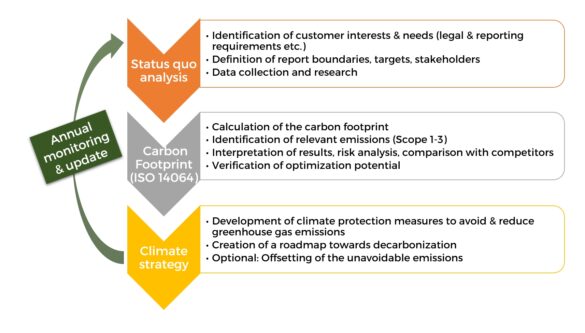Energy + Environment
Climate change management for companies and products
The EU has announced with the Geen Deal the goal of being the first climate neutral continent by 2050. The Green Deal and its guidelines also challenge Austrian companies to enhance their sustainability strategies through climate change management, to reach climate neutrality/ net zero.
The earlier the transformation of a business model or product is done, the more efficient and precise this transformation will be. Climate change management has the long- term goal that companies firstly need to prepare for new legal requirements and increase the efforts for decarbonization of their core operating business as well as the whole value chain. To achieve its climate goals, the decarbonization of the industrial sector is fundamental. CO2 is the important metric to manage measures such as carbon prices or other incentives. There are currently 64 CO2 – pricing strategies worldwide in use; in October 2022 the CO2 tax was introduced in Austria, which will be increased yearly.
Implementing the Green Deal
The effects of the climate crisis are being felt worldwide, causing enormous damage every year. Our society must cope with the most comprehensive transformation process in history – and time is running out.
In December 2020, the European Union announced a new climate target: To reduce at least 55 percent of greenhouse gases by 2030 (compared to the level in 1990) and to make Europe the world’s first climate-neutral continent by 2050. This transformation will take place in the framework of the European Green Deal, the EU’s new growth strategy, which forms the backbone of Europe’s sustainability efforts. It is an integral part of the EU’s strategy for implementing the Sustainable Development Goals (SDGs) and for achieving the Paris Agreement (2-degree target).
In addition to carbon pricing, however, Austrian companies also face other challenges with regard to climate protection and the Green Deal. The new reporting obligation according to the Corporate Sustainability Reporting Directive (CSRD), which already applies to listed companies from 2024, the EU taxonomy, which has already come into force, but also strict due diligence obligations through the Corporate Sustainability Due Diligence Directive (CSDDD) demand transparency in the form of key figures, management plans and strategies.
Caution: Greenwashing!
The Green Deal also established a lot of new guidelines and rules for products. By that, the EU commission tries to prevent “green claims”. Clear definitions, for example of the term “climate neutrality” (in the context of self-declared labels) will help.
It will be even more important for companies to be able to demonstrate transparent and traceable carbon footprints and decarbonization- strategies. The latest results of a study by the Consumer Protection Department of the Upper Austrian Chamber of Labour in cooperation with ConPlusUltra have made clear how misleading the climate label jungle has become. Even companies that act with good intentions can fall into the greenwashing trap due to the lack of rules. We offer support in the form of detailed CO2 analyses, market comparisons and communication advice.
CO2 footprint for companies
ConPlusUltra can advise your company on identifying key challenges in advancing climate strategies and will accompany you step by step on the path towards climate neutrality.

Learn more about carbon footprints for companies
CO2 footprint for products
It is becoming increasingly relevant for customers, consumers or shareholders to know the environmental impact of the products or services they use. A CO2 footprint for products (Product Carbon Footprint) identifies the impact they have on climate change along the entire value chain.
Learn more about the product carbon footprint
CO2 ANALYSES FOR CITIES AND REGIONS
Cities and regions also have to face the challenges of the climate crisis, as in a city not only many greenhouse gas emissions are being produced, but also a lot of people are directly affected by climate change and the environmental pollution.
Hence, the reduction of emissions in the area of public administration must be promoted just as much as the topics of climate change adaptation and resilience. Cities also have a role model effect and thus a responsibility to align their decarbonisation strategy particularly quickly in the direction of Net-Zero. ConPlusUltra advises with the acquisition and monitoring of greenhouse gases in cities and regions and helps identifying data gaps. We also help developing measures and solutions in the energy and mobility sector.
Climate protection strategy
For many companies the pathway to climate neutrality is complex and still unclear. In addition to the identification of risks, it is also important to assess the opportunities that sustainable, decarbonized production harbour. This is achieved through a climate protection strategy at the corporate level.
Learn more about climate protection strategy
Tools:
To calculate your CO2 balance sheets, we use digital and smart solutions:
Here you get back to our energy and environment consultancy services




